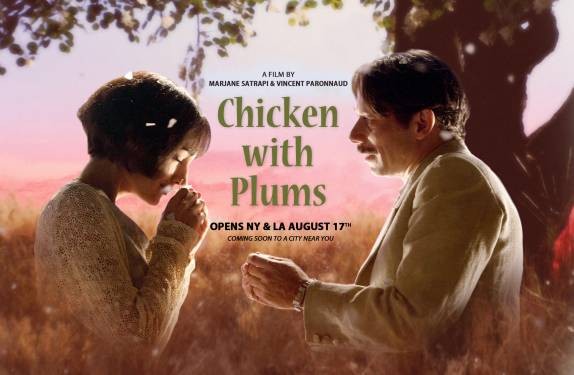
CHICKEN WITH PLUMS/ POULET AUX PRUNES
France, 2011, 96 minutes, Colour.
Mathieu Amalric, Edoardo Baer, Maria de Meideros, Golshifteh Farahani, Eric Caravac, Chiara Mastorianni, Isabella Rossellini, Jamel Debbouze.
Directed by Marjane Satrapi, Vincent Paronnaud.
Chicken with Plums is the work of writer-director, Marjane Satrapi, who made an impact with her first film, the animated Persepolis. She later made The Gang of the Jotas.She works here with fellow-director, Vincent Parannoud.
The narrative is quite complex in its presentation, using a great number of flashbacks, and even some flash-forwards to the fate of the hero’s son as he goes to live in the United States and absorbs their values and way of life.
At the centre of the film is Nasser Ali, played by Mathieu Amalric. He has had an unhappy life, an unhappy marriage to a woman who has has loved him since childhood (Maria de Madeiros). She has smashed her husband’s violin and he is unable to find a proper replacement and so decides to die. It takes eight days for him to die, going back over his life and postponing his decision, considering various ways. He remembers the love of his life and her father forbidding her to marry him. There is pathos when he actually encounters the woman, now grandmother, in the street and she claims not to know him – though she turns the corner in grief. It seems that he should now die.
Some of the flashbacks involve his protective mother, played by Isabella Rossellini.
With the complexity of the narrative, the jigsaw puzzle of his life and the audience finding the direct narrative as well as the explanations for his behaviour, the film is always interesting and challenging.
1. The work of the directors, their previous films? Their skill in animation? Incorporating animation into the narrative? The effect of the juxtaposition?
2. The title, the reference to Nasser Ali’s favourite meal, the visuals of his enjoying it?
3. The nature of the storytelling, the Persian tradition, the traditional beginnings? This film as an exercise in storytelling? Of Tehran in 1958? The narrator and his visit, hearing the story and re-telling it?
4. The portrait of Nasser Ali? In the present, his status as a violinist, reputation? Playing the violin? His wife smashing it? Going to the store, the storekeeper and his bargain, the violinist dissatisfied, returning, demanding a new violin? His meal with his brother, the discussions, the brother as a Communist and the violinist with a different perspective? The story of the violin in the country town? His decision to go? The clash with his wife, her anger, the problem of looking after their son? His taking them on the bus, the son and his exuberance, singing and going up and down the aisle? His father trying to control him?
5. Going through the market, asking directions, his son delayed with the fish? Going to the shop, the genial shopkeeper, remembering Nasser Ali’s reputation, wanting to stay, the contents of the shop, the means of subduing his son, the gift of the violin, smoking the opium? The return? His dissatisfaction with the violin? The decision not to play ever again? His death wish?
6. The eight days of his dying, each signalled? The nature of his death wish? The influences from the past? His long lost love, alienation from his wife? His music and the instrument?
7. The narrative of his last eight days, the flashbacks to the past? The significance and style of the animation? The episode in North America, his cousins, very American, giving up the traditions of Iran?
8. The various characters from his past and their influence on him: his brother, the rivalry, the arguments, the comparisons, his brother and politics, his lack of interest? His wife, their being children, his not being attracted to her, his father and the advice of a prudent marriage? The young girl, loving him, chasing him? Her delight in the arrangements for the wedding? The years passing? His lack of love her, the complaints? Her own frustration, cooking his favourite meal, yet angry with him? Smashing the violin? Their son? Her staying with him, helping him while he was dying?
9. The daughter of the shopkeeper, his seeing her, attracted to her, excuses to go the store for the repair of the clock, their various meetings, talks? The father’s disapproval? The love of his life? His being warned away, his travelling abroad, his music? Her saying that she would forget him? The significance of seeing her so many years later, her being a grandmother, with the child, in the town, his accosting her, saying that she did not know him? Her turning the corner, her grief?
10. The character of the one armed beggar and his friendship and advice?
11. The image of death, the conversations with death, death of the philosophy, deciding when to come?
12. The portrait of an eccentric man, unlikeable, talented, his review of his life, death, and finding it difficult to come to terms with death?